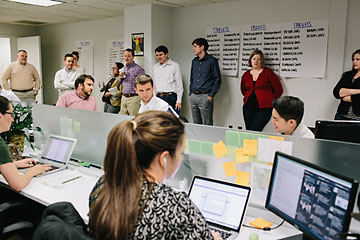
(3 of 4)
When retired Air Force colonel Rob Maness decided to run for the Republican Senate nomination in Louisiana, the first calls he made were not to GOP officials. They went, Maness recalls, to the heads of five outside groups that endorse and fund staunch conservatives: the Club for Growth, FreedomWorks, the Madison Project, the Senate Conservatives Fund and Heritage Action for America. Not long after, he wound up at a scuffed wooden table in the suite the Club for Growth occupies in an office building near the White House, where three or four staffers put him through a grueling policy murder board. "They want to know whether you have the principled perspective of no compromise on certain things," Maness says.
The Club has interviewed more than 100 Republican candidates this cycle. So far, it has endorsed just five. (At this point, Maness is not among them.) Party grandees moan that the Club's habit of targeting moderate Republicans makes it an unwitting ally of Democrats. But the carping is "music to our members' ears," says Chris Chocola, the group's silver-haired president. "Think about what they're saying: we're more effective with a staff of 11 people than they are with thousands."
The Secret Meetings
As Clinton's army mustered in Iowa this winter, another mercenary force was gathering 1,600 miles away at a posh resort in the California desert. The private conclave, convened by the billionaire Koch brothers Charles and David, is a biannual rite for conservative magnates and hedge-fund managers, an opportunity to hobnob and plot strategy. The agenda and attendees are normally shrouded in secrecy. But this time somebody goofed.
An agenda for the summit was left behind by a guest. The document offers a rare peek into the intricate political empire the Kochs have assembled, which links deep-pocketed conservatives with an array of nonprofit political groups that the Kochs use to cloak contributions. The bigger the player, the more exclusive the meeting, according to the list published by Mother Jones. While some in attendance met with midlevel functionaries in the resort lobby, top donors--like Boston hedge-fund magnate John Childs, who gave $4.2 million to super PACs in 2012, or Dallas businessman Robert Rowling, who gave $3.6 million--were scheduled to receive a private audience at a nearby Koch residence, the document suggests.
It's all a reflection of the larger shift away from the parties, which once served as the gatekeepers. The Koch political network raised an estimated $400 million in 2012, according to the Center for Responsive Politics, and its impact in 2014 is already being felt. Americans for Prosperity, a Koch-backed nonprofit outfit that seeds the conservative grassroots with cash, has spent more than $27 million since August battering vulnerable Democrats over the rocky rollout of the Affordable Care Act, including some $8 million in ads against Hagan in North Carolina. If Republicans retake the Senate in November, the group--and its policy goals--will get much of the credit.
